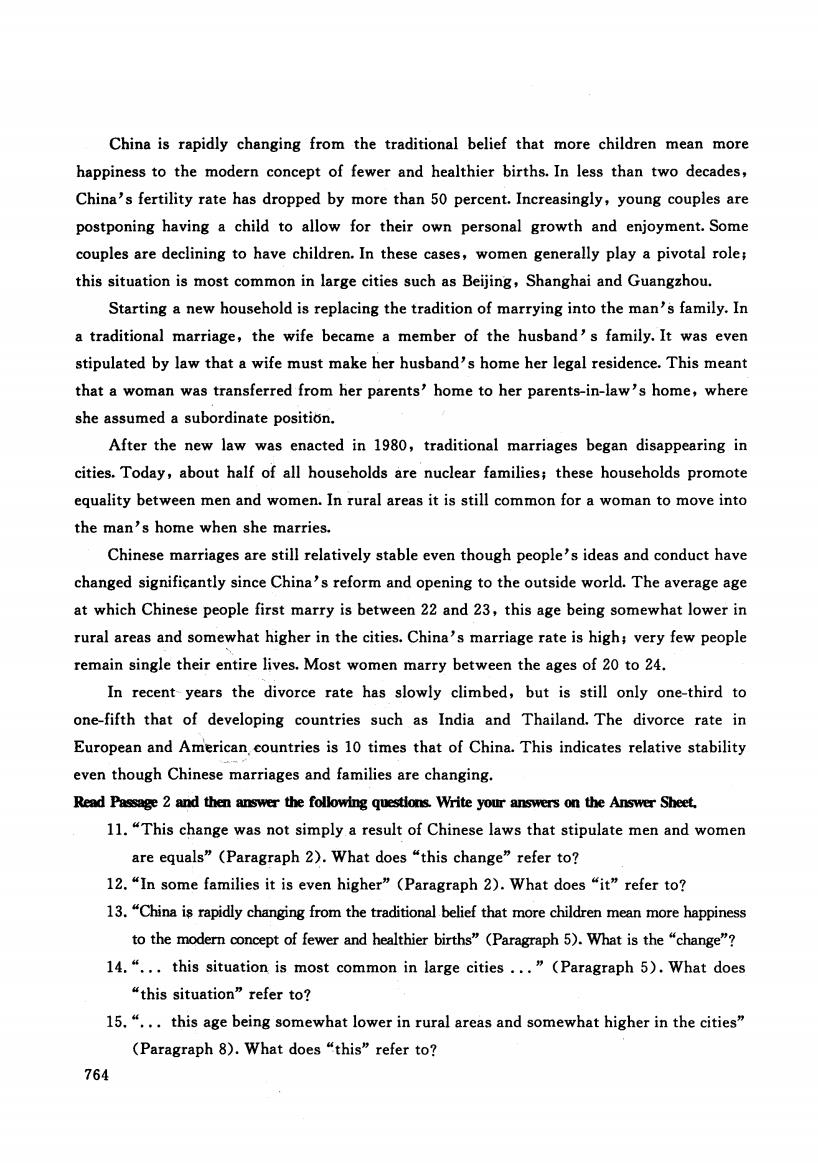正在加载图片...

China is rapidly changing from the traditional belief that more children mean more happiness to the modern concept of fewer and healthier births.In less than two decades, China's fertility rate has dropped by more than 50 percent.Increasingly,young couples are postponing having a child to allow for their own personal growth and enjoyment.Some couples are declining to have children.In these cases,women generally play a pivotal role; this situation is most common in large cities such as Beijing,Shanghai and Guangzhou. Starting a new household is replacing the tradition of marrying into the man's family.In a traditional marriage,the wife became a member of the husband's family.It was even stipulated by law that a wife must make her husband's home her legal residence.This meant that a woman was transferred from her parents'home to her parents-in-law's home,where she assumed a subordinate position. After the new law was enacted in 1980,traditional marriages began disappearing in cities.Today,about half of all households are nuclear families;these households promote equality between men and women.In rural areas it is still common for a woman to move into the man's home when she marries. Chinese marriages are still relatively stable even though people's ideas and conduct have changed significantly since China's reform and opening to the outside world.The average age at which Chinese people first marry is between 22 and 23,this age being somewhat lower in rural areas and somewhat higher in the cities.China's marriage rate is high;very few people remain single their entire lives.Most women marry between the ages of 20 to 24. In recent years the divorce rate has slowly climbed,but is still only one-third to one-fifth that of developing countries such as India and Thailand.The divorce rate in European and American,countries is 10 times that of China.This indicates relative stability even though Chinese marriages and families are changing. Read Passage 2 and then answer the following questions.Write your answers on the Answer Sheet. 11."This change was not simply a result of Chinese laws that stipulate men and women are equals'”(Paragraph2).What does“this change'”refer to? l2.“In some families it is even higher'”(Paragraph2).What does“it”refer to? 13."China is rapidly changing from the traditional belief that more children mean more happiness to the modern concept of fewer and healthier births"(Paragraph 5).What is the "change"? 14."..this situation is most common in large cities..."(Paragraph 5).What does “this situation”refer to? 15."..this age being somewhat lower in rural areas and somewhat higher in the cities" (Paragraph8).What does“this”refer to? 764China is rapidly changing from the traditional belief that more children mean more happiness to the modern concept of fewer and healthier births. In less than two decades, China's fertility rate has dropped by more than 50 percent. Increasingly , young couples are postponing having a child to allow for their own personal growth and enjoyment. Some couples are declining to have children. In these cases, women generally playa pivotal role; this situation is most common in large cities such as Beijing , Shanghai and Guangzhou. Starting a new household is replacing the tradition of marrying into the man'sfamily. In a traditional marriage , the wife became a member of the husband' s family. It was even stipulated by law that a wife must make her husband's home her legal residence. This meant that a woman was transferred from her parents' home to her parents-in-Iaw's home , where she assumed a subordinate position. After the new law was enacted in 1980 , traditional marriages began disappearing in cities. Today , about half of all households are nuclear families; these households promote equality between men and women. In rural areas it is still common for a woman to move into the man's home when she marries. Chinese marriages are still relatively stable even though people's ideas and conduct have changed significantly since China's reform and opening to the outside world. The average age at which Chinese people first marry is between 22 and 23 , this age being somewhat lower in rural areas and somewhat higher in the cities. China's marriage rate is high; very few people \ remain single their entire lives. Most women marry between the ages of 20 to 24. In recent years the divorce rate has slowly climbed, but is still only one-third to one-fifth that of developing countries such as India and Thailand. The divorce rate in European and Amtrican,.countries is 10 times that of China. This indicates relative stability even though Chinese marriages and families are changing. Read pa!黯哩It! 2 and thai amw ollowi uestiOlll rite answers on Answer 11. "This change was not simplya result of Chinese laws that stipulate men and women are equals" (Paragraph 2). What does "this change" refer to? 12. "In some families it is even higher" (Paragraph 2). What does "it" refer to? 13. "China i~ rapidly changing from the traditionalbelief that more children mean more happiness to the modern ∞n出pt of fewer and healthier births" (Par唔raph 5). What is the "change"? 14. ". .• this situation is most common in large cities. . ." (Paragraph 5). What does "this situation" refer to? 15. ". •• this age being somewhat lower in rural areas and somewhat higher in the cities" (Paragraph 8). What does "this" refer to? 764